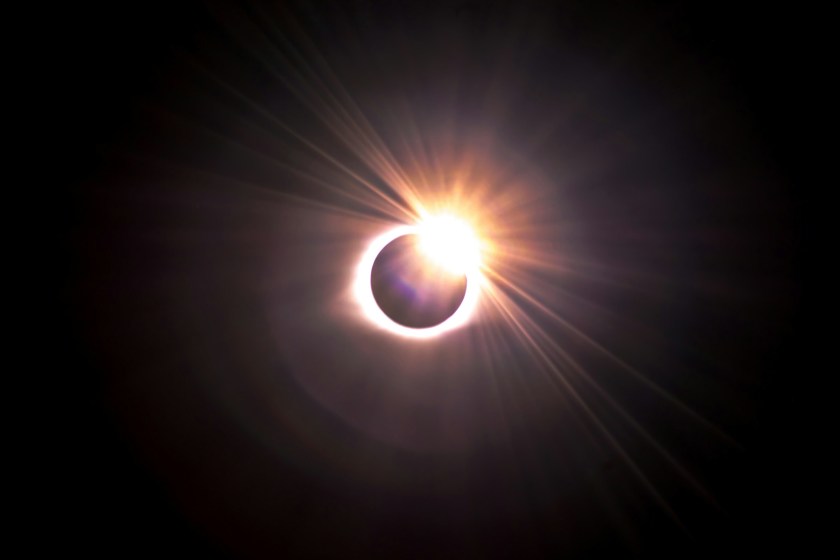
3 Safe Ways to Enjoy the 2024 Solar Eclipse
Written by Dr. Elaine Ramos, OD, Nationwide Vision
We're gearing up for an awe-inspiring celestial showcase – the Solar Eclipse on April 8th, 2024. This event will feature the Moon moving across the Sun, briefly concealing it from view. Some regions in the United States will be treated to the complete darkness of totality, but no matter where you are, you'll see the Moon start to cover the Sun.
However, safety first! Before you turn your eyes skyward, understanding the correct and safe way to observe the eclipse is crucial. There are important precautions to take and hazards to be aware of. Dr. Elaine Ramos, O.D., a distinguished optometrist with EyeCare Partners, is here to guide you through safely experiencing the solar eclipse. Before taking part in this exciting celestial event, you need to make absolutely sure that you are using the appropriate equipment to keep your eyes safe. Not taking the proper steps could put your eyes at risk for permanent damage.
Understanding the Risks of Eclipse Viewing
Ordinarily, the Sun's glare is too powerful for our eyes, making it unsafe to look at directly, even with the aid of polarized sunglasses. A brief glance can lead to significant eye injury, such as solar retinopathy. When you stare at the Sun, you are placing the center of your vision, the fovea, directly into the light’s path. The Sun’s intense light then causes damage to the fovea and surrounding retinal cells, causing blurry vision or even loss of central vision.
Even when the Moon shields part of the Sun during an eclipse, the light that filters through can be just as harmful. This is particularly true during the total phase of the eclipse, when the Sun's rays, though partly blocked, are still potent. Another name for solar retinopathy is actually eclipse retinopathy because of how dangerous this event is on the eyes. So even if it seems like the light isn’t as bright, the light that still makes it to your eyes is just as intense as any other day. This is why staring directly at the solar eclipse without any protection is going to place your eyes at a significant risk for damage.
For information on how much of the Sun will be covered in your area, consider using resources like the Eclipse Cities tracker.
Tips for a Safe Solar Eclipse Viewing in 2024
Witnessing a solar eclipse is a remarkable experience, and ensuring eye safety during the event is essential. There are numerous methods to watch the eclipse safely without compromising your vision.
Protective Eclipse Eyewear
To experience the solar eclipse directly, it's essential to use specially designed solar eclipse glasses. Unlike ordinary sunglasses, these glasses are engineered to block out more than 99.999% of the sun's rays, making it safe to view the eclipse directly. Look for glasses that comply with the ISO 12312-2 standard, affirming their safety for eclipse viewing. The American Astronomical Society lists trusted vendors that sell these critical protective glasses.
Eclipse Events at Observatories
Observatories often seize the opportunity of a solar eclipse to organize educational gatherings, offering a prime chance for a safe and informative viewing experience. If you're near an observatory, see what activities they have planned for eclipse day. They may distribute eclipse glasses or broadcast the eclipse live on big screens, providing a unique way to experience the celestial event, even if you're not in the direct path of totality.
Build Your Own Eclipse Viewer
For those who can't access eclipse glasses or attend an observatory event, crafting a homemade Sun Viewer is a creative and safe option. Despite its name, this device is not meant for direct solar observation. Instead, it projects an image of the sun onto a viewing surface within the box, mirroring the functionality of a pinhole projector but on a potentially larger scale. Embarking on this DIY project can offer a safe and enjoyable eclipse-watching experience from anywhere.
Safely Embrace This Unique Celestial Event
As we count down to this extraordinary astronomical event, emphasizing safety is essential to a memorable and enjoyable experience. Considering it will be another 20 years before the United States witnesses another solar eclipse, safeguarding your eyesight is critical. To witness this year’s spectacular solar event without damaging your vision, it’s vital to equip yourself with the appropriate eye protection. Proper planning will allow you to safely marvel at the eclipse, sparing you from an unexpected visit to the eye doctor and long-term vision damage.

About the Author: Dr. Elaine Ramos, OD
Dr. Elaine Ramos, OD, received her Bachelors of Science degree from California State University, Fullerton and earned her Doctorate of Optometry from Marshall B. Ketchum University. She completed a residency in vision therapy and neuro-rehabilitation from the State University of New York College of Optometry.
Prior to joining Nationwide Vision, Dr. Ramos was an assistant professor at Western University College of Optometry in Pomona, CA and adjunct professor at Midwestern University in Glendale, AZ where she practiced in the pediatrics and vision therapy clinics. She currently resides in Peoria, AZ with her husband, baby girl, and corgi named Butters.